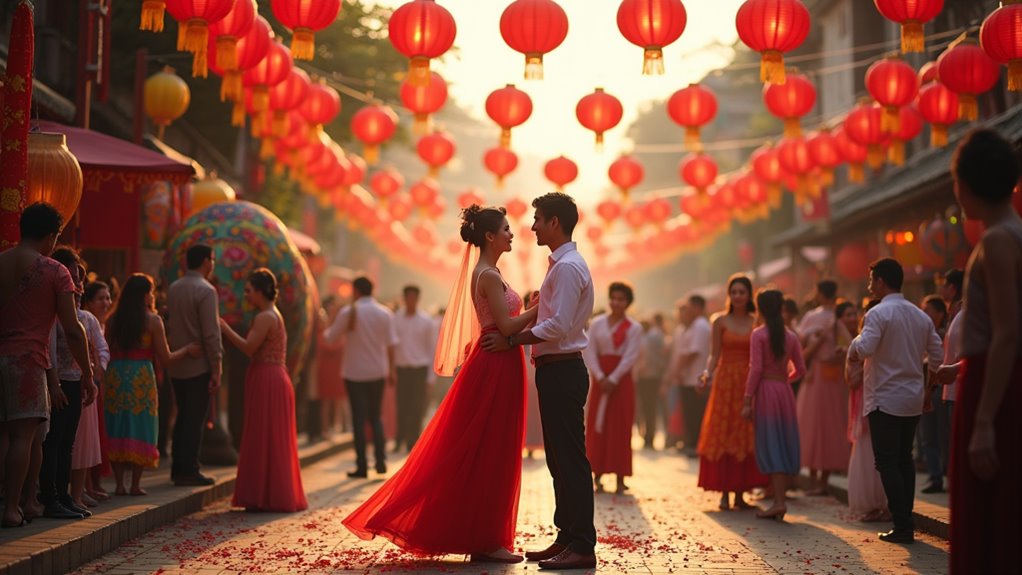Across the world, countries celebrate love in unique and meaningful ways that reflect their culture and values. From romantic dinners to vibrant festivals, these traditions reveal how different societies honor relationships and connection. You might be surprised by the diversity of customs, each with its own story and significance. Curious to see how love takes shape in various parts of the world? There’s more to discover about these fascinating traditions.
Key Takeaways
- Countries celebrate love through unique festivals like Thailand’s Songkran water festival and China’s Red Egg and Ginger Festival.
- Romantic traditions such as love locks in Paris symbolize eternal love and commitment.
- Japan’s White Day emphasizes gratitude with men reciprocating women’s chocolates with white gifts.
- South Korea and India showcase love through special foods and spiritual rituals, like heart-shaped rice cakes and Radha-Krishna worship.
- Community events like Spain’s kissing festival (“El Día del Beso”) strengthen social bonds through shared affection.
The Valentine’s Day Fiesta in the Philippines
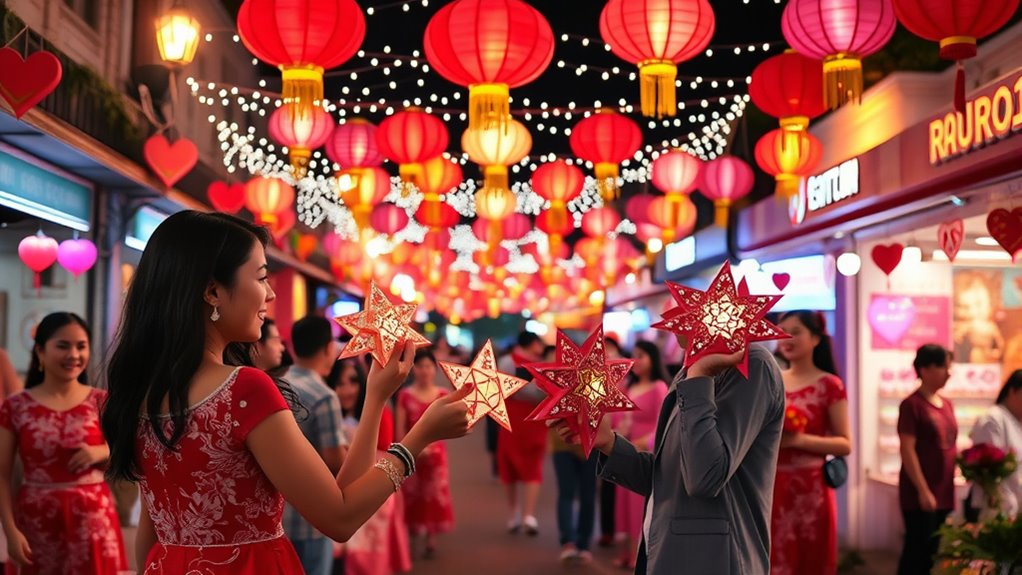
Have you ever wondered how Filipinos celebrate love with such vibrant energy? On Valentine’s Day, the country transforms into a lively fiesta of affection. You’ll notice people engaging in Valentine’s Day gift giving, exchanging tokens of love like flowers, chocolates, and heartfelt notes. The celebrations often include romantic dinner customs, where couples enjoy special meals at cozy restaurants or prepare homemade dishes to share. Street parties and parades showcase colorful decorations and lively music, emphasizing community joy. Filipinos see this day as an opportunity to express love openly, whether through grand gestures or simple acts of kindness. The lively atmosphere and heartfelt exchanges make Valentine’s Day in the Philippines a truly unique and memorable celebration of love. Additionally, the festive environment encourages community bonding and shared happiness among neighbors and friends.
The White Day Revival in Japan
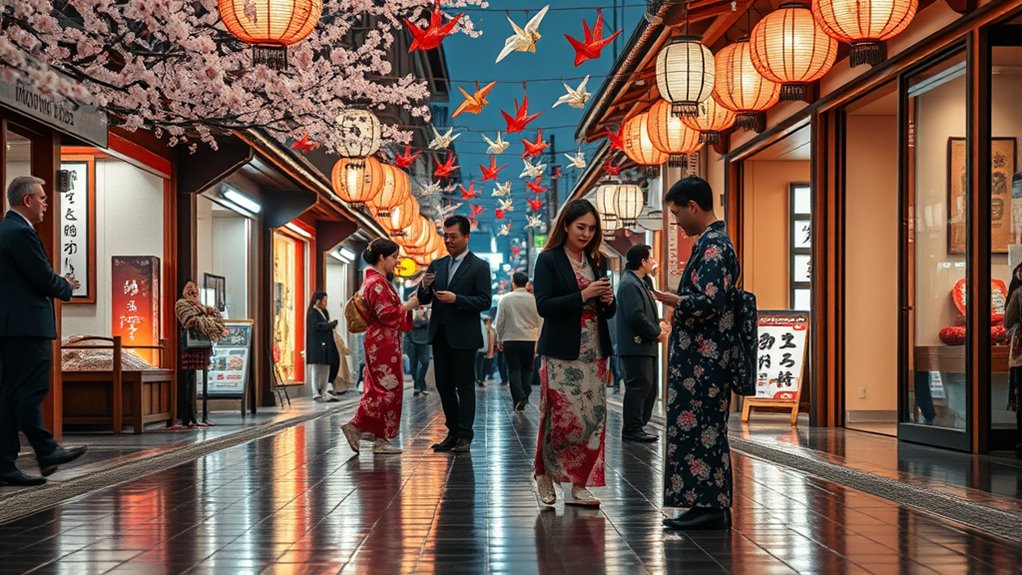
The White Day revival in Japan has gained momentum as a modern twist on traditional gift-giving customs. Rooted in the cultural significance of expressing gratitude, it originated in the 1970s as a response to Valentine’s Day, where women typically gave chocolates. Now, men reciprocate with white gifts like chocolates, jewelry, or marshmallows. This practice emphasizes appreciation and strengthens bonds. The revival reflects Japan’s blending of contemporary trends with historical origins, highlighting respect and thoughtfulness. Visualize:
The White Day revival celebrates gratitude and love through elegant gifts, blending tradition with modern Japanese culture.
- Men presenting elegant boxes of white chocolates
- Couples exchanging delicate jewelry
- Romantic gestures amid cherry blossoms
This movement isn’t just about gift exchange; it’s a cultural ritual that celebrates love and gratitude, reinforcing the importance of meaningful connections in Japanese society. Additionally, Efficient General Ledger Coding enhances financial transparency and supports the organization of these cultural celebrations by ensuring accurate record-keeping.
The Love Locks Tradition in Paris
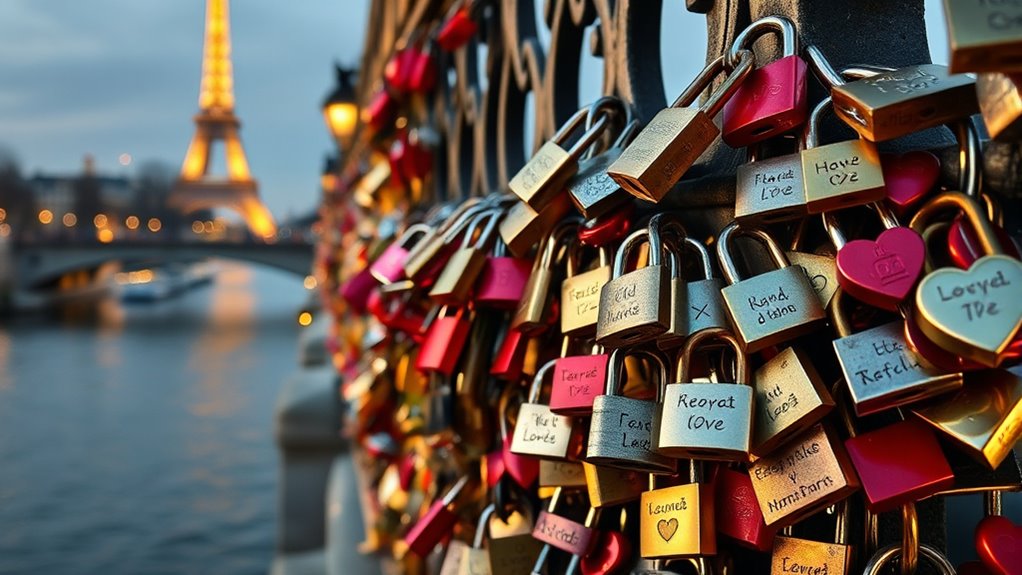
When you visit Paris, you’ll see couples attaching locks to the city’s bridges as a symbol of their eternal love. These locks represent a promise to keep love alive forever. It’s a simple yet powerful tradition that captures the romantic spirit of the city. Interestingly, similar romantic traditions are celebrated in various countries around the world, each with their own unique customs.
Symbol of Eternal Love
In Paris, couples seal their promises of eternal love by attaching padlocks to the city’s iconic bridges, creating a shimmering display of devotion. This love locks tradition represents romantic symbolism and serves as a powerful cultural expression of commitment. As you walk along, you’ll see thousands of locks, each with initials or messages, symbolizing unbreakable bonds. These locks transform the bridges into open-air altars of love, capturing the city’s romantic spirit. The act of locking and leaving the key behind signifies trust and permanence. The tradition reflects deep cultural meanings, blending personal vows with shared history. Additionally, many couples incorporate home decoration inspiration into their celebrations, making the act of attaching a love lock a personalized and meaningful ritual. It’s a visual testament to love’s enduring power, inspiring visitors and locals alike to celebrate their own heartfelt connections in a uniquely Parisian way.
Locking Love Forever
Walking along Paris’s iconic bridges, you’ll notice countless padlocks engraved with initials or messages, symbolizing couples’ promises to stay together forever. This love locks tradition is rich in cultural symbolism, representing eternal commitment. Its historical origins trace back to 2008 when a Serbian-inspired act of romance sparked a trend among lovers. Couples attach locks to railings, then throw the keys into the river, symbolizing unbreakable bonds. Over time, the practice became a global phenomenon, especially in Paris, where the city’s romantic reputation amplifies its significance. Although some authorities remove the locks to preserve the bridges, the tradition endures as an enduring symbol of love’s permanence. By locking their love, couples create a tangible, heartfelt testament to their lifelong devotion. The cultural symbolism of the love locks continues to resonate with people worldwide, emphasizing the universal desire for lasting connection.
The Songkran Water Festival in Thailand
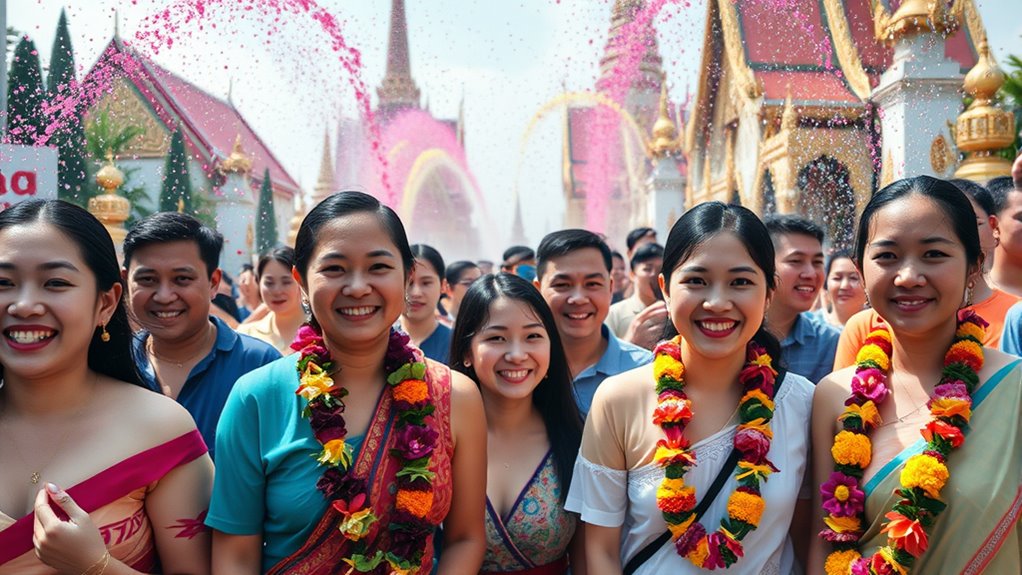
During the Songkran Water Festival in Thailand, you’ll participate in lively water splashing traditions that symbolize cleansing and renewal. The festival’s festive activities also include parades, traditional dances, and communal celebrations that bring people together. It’s a vibrant way to embrace new beginnings and express joy through water and community spirit. This celebration is also a form of cultural offensive security measures, showcasing how traditional practices can serve as a form of cultural resilience and identity.
Water Splashing Traditions
The Songkran Water Festival in Thailand transforms the streets into lively battlegrounds where people splash water to celebrate the New Year. This tradition holds deep cultural symbolism, representing purification and renewal. You’ll see locals and tourists alike engaging in playful water fights, symbolizing the washing away of bad luck. The ritual significance lies in honoring ancestors and fostering community bonds through shared joy. As water is splashed, it’s more than just fun—it’s a meaningful act connecting past and present. Expect to see:
- Crowds dousing each other with buckets and hoses
- Traditional water pouring ceremonies on statues and elders
- People dressed in colorful, traditional attire amidst the chaos
- Sustainable practices being incorporated by some participants to reduce water waste during festivities
This lively custom embodies a festive spirit rooted in cultural symbolism, celebrating fresh beginnings.
Symbolism of Renewal
At the heart of the Songkran Water Festival lies a powerful symbolism of renewal, reflecting Thailand’s deep cultural belief in starting fresh. This celebration embodies renewal symbolism, marking the passage into a new year with hopes for prosperity and health. As you participate, you’re embracing a tradition of cultural rebirth, washing away past misfortunes and negative energies. The water symbolizes cleansing and fresh beginnings, allowing you to shed old burdens and welcome new opportunities. This act of renewal isn’t just physical but spiritual, reinforcing the idea that each new year offers a chance for growth and transformation. Through this vibrant festival, you experience a collective act of rejuvenation, deeply rooted in Thailand’s cultural ethos of renewal and hope for the future. Understanding cultural symbolism enhances appreciation of these meaningful traditions.
Festive Celebrations and Activities
Participating in the Songkran Water Festival is an exhilarating experience filled with lively activities and vibrant celebrations. You’ll find streets alive with people splashing water, symbolizing cleansing and renewal, which holds deep cultural significance. The festival’s regional variations add unique flavors—some areas feature grand parades, while others emphasize religious rituals. Incorporating real-time monitoring systems during the festivities can help ensure safety and security for all participants.
As you join in the fun, imagine:
- Throwing water balloons and hoses at friends and strangers alike
- Visiting temples to make merit and pay respects
- Dancing to traditional Thai music amidst colorful floats
This festival isn’t just about fun; it’s a meaningful way to honor ancestors and welcome the new year. The energetic atmosphere and regional customs make Songkran an unforgettable celebration of love and renewal.
The Red Egg and Ginger Celebration in China
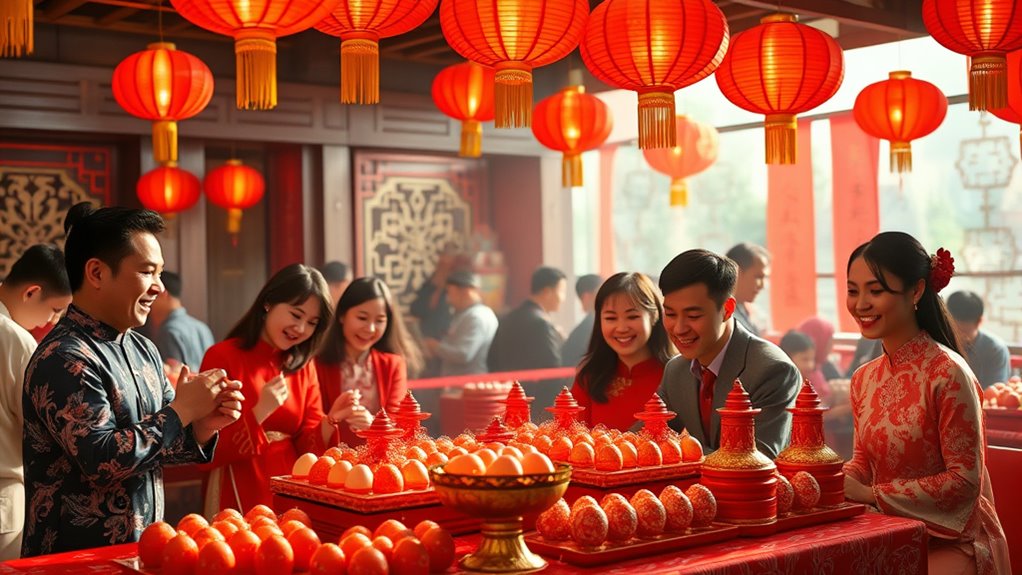
When a newborn arrives in China, families often celebrate with the Red Egg and Ginger Festival, a tradition rooted in symbolizing good luck and new beginnings. This celebration holds deep cultural significance, emphasizing family bonds and positive wishes for the child’s future. During the event, you’ll see eggs dyed bright red, representing happiness and vitality, often given to relatives and friends. The inclusion of ginger signifies warmth and health. These traditional customs date back centuries and are passed down through generations, reinforcing cultural identity. The event is more than just a gift exchange; it’s a meaningful way for families and communities to come together, expressing love, hope, and unity through simple yet powerful rituals. The use of color symbolism such as red and ginger enhances the emotional and cultural impact of the celebration.
The Engagement Lanterns in Myanmar
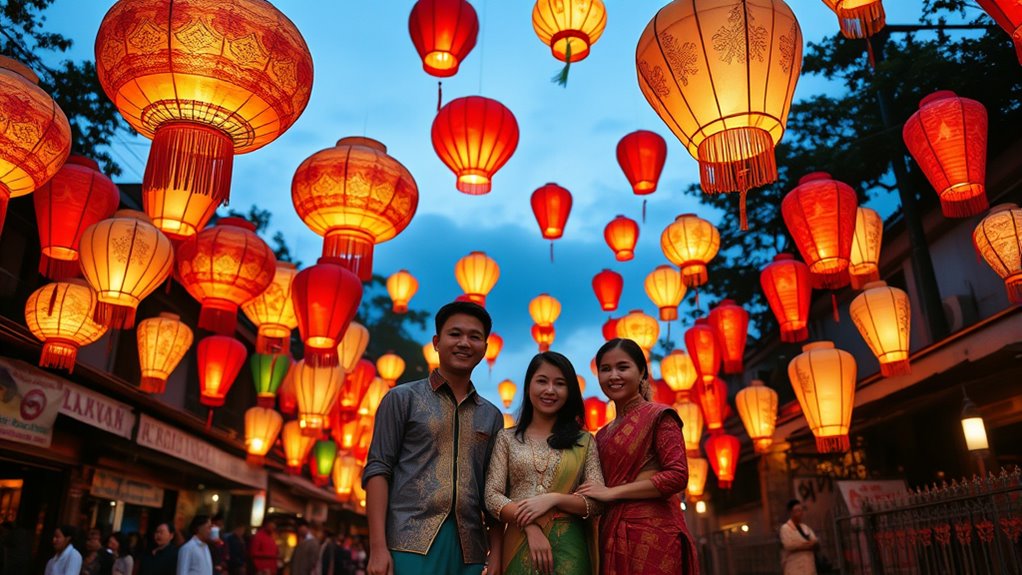
Have you ever wondered how love is celebrated in Myanmar? One of the most enchanting love rituals involves lantern lighting during engagement celebrations. Couples release floating lanterns into the night sky, symbolizing hope and new beginnings. These glowing lanterns create a mesmerizing scene, illuminating the dark with warm, shimmering light. During this tradition, families gather to support the couple, making the moment even more special. The act of releasing lanterns signifies letting go of past worries and embracing love’s journey ahead. As the lanterns drift upward, they carry wishes for happiness and prosperity. This beautiful tradition transforms an ordinary night into an extraordinary display of love, hope, and unity, making it a truly unforgettable way for couples to celebrate their commitment.
The Kissing Festival in Spain
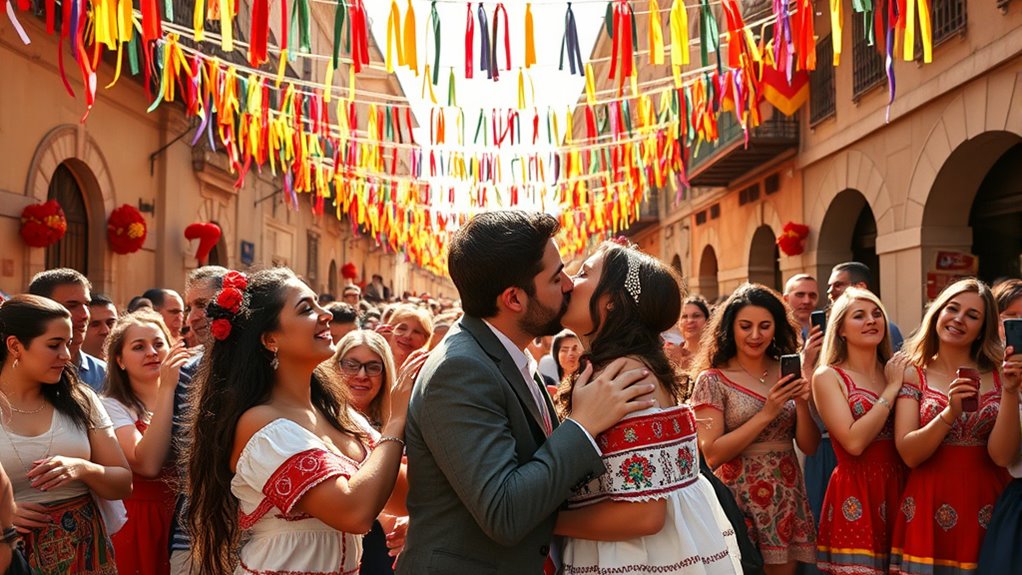
In Spain, love celebrations reach a lively peak during the famous Kissing Festival, known locally as “El Día del Beso.” This spirited event transforms towns and cities into vibrant hubs where couples and friends share kisses to honor love and affection. The cultural significance of the festival lies in its celebration of connection and intimacy, emphasizing the importance of love in everyday life. Its origins trace back to centuries-old traditions that highlight unity and joy through physical affection. During the festival, streets fill with lively music, dance, and the unmistakable act of sharing kisses, symbolizing friendship, romance, and community. As you participate, you’ll feel how this lively custom strengthens bonds and reflects Spain’s passionate attitude toward love and human connection.
The Radha-Krishna Love Worship in India
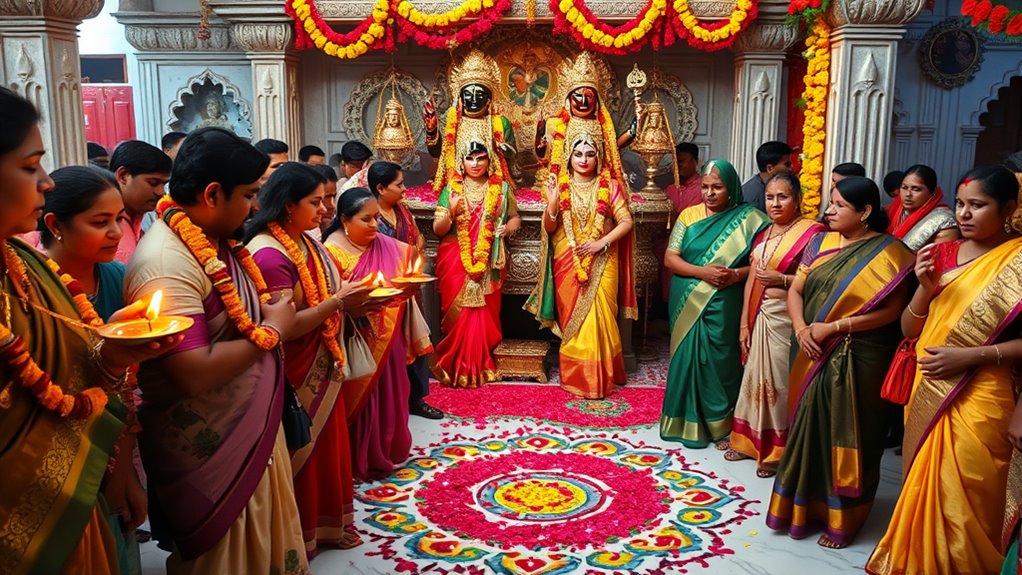
The Radha-Krishna love worship in India is a vibrant spiritual tradition that celebrates divine love through devotion and rituals. You immerse yourself in meditative devotion, feeling the spiritual connection deepen with each prayer. Devotees offer ritual offerings such as fresh flowers, sweets, and incense, creating a fragrant, colorful atmosphere. Temples are alive with singing bhajans and dancing, embodying love’s joyful essence. As you participate, you visualize Radha’s unwavering devotion to Krishna, inspiring your own expressions of love and devotion. The atmosphere is filled with a sense of unity, passion, and spiritual longing. This tradition invites you to experience love not just as an emotion but as a divine, eternal bond that transcends the worldly.
The Heart-Shaped Rice Cakes in South Korea
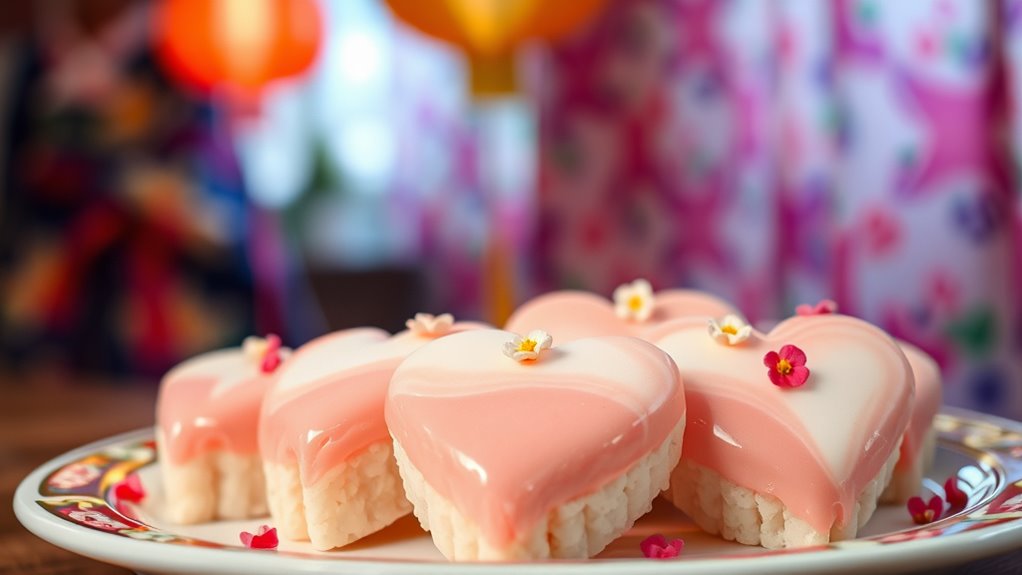
Love celebrations often take playful and delicious forms around the world, and South Korea’s heart-shaped rice cakes exemplify this joyful tradition. These rice cakes, called “tteok,” symbolize love and affection, especially during special occasions like Seollal and chuseok. Their cultural significance lies in representing unity and heartfelt emotions. Making these cakes involves traditional recipes passed down through generations, emphasizing craftsmanship and cultural heritage. The heart shape is carefully crafted to convey love’s warmth, making the act of sharing these treats a meaningful gesture. As you enjoy these beautifully made rice cakes, you participate in a tradition that celebrates love’s sweetness and cultural richness. This charming custom highlights how food can express deep emotions and preserve cherished traditions in South Korea.
Frequently Asked Questions
How Do Rural Communities Participate in These Love Celebrations?
In rural communities, participation in love celebrations often centers on community involvement and tradition. You might find locals coming together to organize events, sing, dance, or share stories that honor love and relationships. Rural participation is usually more intimate, with neighbors and families playing key roles. These celebrations strengthen bonds and keep cultural customs alive, making love festivities a heartfelt expression of community spirit and shared values.
Are These Traditions Exclusive to Certain Age Groups or Inclusive of All Ages?
This question’s like unraveling a colorful tapestry of love, full of vibrant threads. Many traditions aren’t age-specific; they embrace intergenerational inclusivity, celebrating love across all ages. Some cultures have age-specific traditions, but many welcome everyone, making love celebrations a universal experience. You’ll find that, in many places, these customs are designed to include families and communities, ensuring that love’s joyful expression isn’t limited by age but is a shared, timeless joy.
What Are the Historical Origins of These Love Rituals?
You might wonder about the historical origins of love rituals. These traditions often have ancient origins, dating back centuries, rooted in cultural evolution. Over time, societies adapted and infused these rituals with new meanings, reflecting their unique histories. By understanding these origins, you gain insight into how love has been celebrated across generations, highlighting the enduring human desire to connect and express affection through culturally significant customs.
How Have Modern Influences Changed Traditional Celebrations Over Time?
Your love celebrations have transformed into a vibrant tapestry, thanks to modern influences. Cultural adaptation allows traditions to evolve with new ideas, but commercialization impacts can sometimes overshadow their original meaning. You might notice grander, more extravagant displays that cater to consumer trends, making these events feel more like festivals than heartfelt rituals. Despite these changes, the core message of love remains, adapting beautifully to our ever-changing world.
Do These Festivals Have Any Regional Variations Within Each Country?
You’ll find that these festivals often have regional customs that create unique experiences within each country. Festival variations can be quite diverse, reflecting local traditions, history, and culture. For example, in some areas, people might exchange handmade gifts, while others focus on specific rituals or performances. These regional differences make each celebration special, allowing you to see how local customs shape the way love is honored across different parts of a country.
Conclusion
No matter where you go, love is celebrated in vibrant, unique ways worldwide. Did you know that over 150 countries observe Valentine’s Day in some form? From romantic street parties to colorful festivals, these traditions remind us that love brings people together across cultures. Embrace these diverse customs and find inspiration to celebrate love in your own special way. After all, love’s universal language connects us all, no matter where you are.
